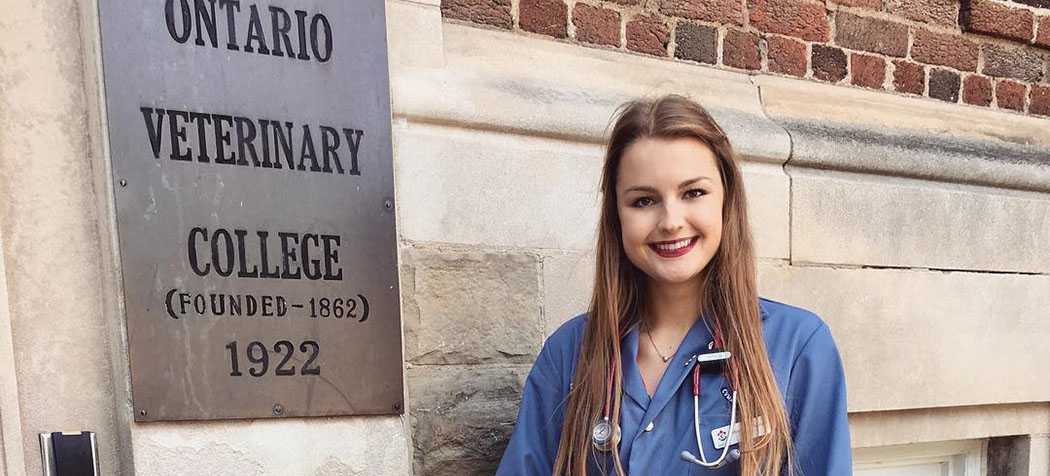
Living the James Herriot Lifestyle: DVM Externship Blog Series, Part 1
July 29, 2022
Part 1 of a 3-part blog series following a student veterinarian through her eight-week externship gaining hands-on experience in a mixed veterinary practice.
Final year Ontario Veterinary College student veterinarians begin their clinical year with an eight-week externship where they have an opportunity to practice their skills in a real world setting as part of a veterinary team providing animal care to the public. Dr. Morganna Turner, OVC DVM 2022, completed her externship in the summer of 2021 at the Paris Veterinary Clinic in Paris, Ontario. Learn more in the intro post Hands-On Training Enhances Student Veterinarians' Skills.
The life of a mixed animal veterinarian is incredibly varied and interesting. If you’ve ever read the James Herriot books (written by a vet about his real-life experiences and adventures with veterinary medicine in the UK in the 1940’s onward), I can tell you that it  is a pretty accurate representation of the lifestyle. You really do see anything and everything, and so must quickly become confident treating all the possible problems of many species - small animals, horses, cows, sheep, goats, pigs; perhaps also birds, small mammals, and reptiles; and maybe even alpacas, camels, and any other animals people might choose to own. This variety, combined with the fact that you are often alone on farm calls and have access to limited equipment and medicines, means it takes an adaptable and capable person to succeed in this career path.
is a pretty accurate representation of the lifestyle. You really do see anything and everything, and so must quickly become confident treating all the possible problems of many species - small animals, horses, cows, sheep, goats, pigs; perhaps also birds, small mammals, and reptiles; and maybe even alpacas, camels, and any other animals people might choose to own. This variety, combined with the fact that you are often alone on farm calls and have access to limited equipment and medicines, means it takes an adaptable and capable person to succeed in this career path.
Over the course of my externship, I was able to work with six talented mixed animal vets at varying stages in their careers, who taught me so much about not only mixed animal medicine, but also about the lifestyle, mentality, and how to succeed in the role. As someone pursuing a career in a mixed practice myself, I found this insight incredibly valuable. Choosing mixed is not just about selecting a branch of veterinary medicine; it will also dictate the way you live. You will have to live relatively close to both the clinic where you work and the large animals that are your patients; you may need to purchase your own truck (which you will need to carry all the medicines and supplies you require on the road); and you must be prepared to rapidly switch mentalities (and often switch clothes and even shower) and adapt to the differences between large and small animal medicine in owner attitudes, finances, and medical approaches.
 One big thing that my externship really highlighted for me is that being a mixed animal vet in a rural setting also means being responsible for patients during the hours the clinic is closed. Vets that enter small animal practice are often fortunate to have a local emergency or after-hours clinic to relieve them of this “on-call” duty, but the vast majority of mixed clinics must handle their own large animal emergencies. This means that all the vets in the practice must split amongst them every night, weekend, and holiday, so that someone is always accessible and ready to help with out of hours medical situations. The veterinarian who is on call carries a pager, and must plan to be available and ready to depart on a farm call for the 24-hours they are on call. This certainly provides great opportunities for a new vet to learn how to handle emergencies and grow clinical confidence, but also impacts many aspects of life outside of being a veterinarian, and so is something that future mixed animal veterinarians need to be prepared for.
One big thing that my externship really highlighted for me is that being a mixed animal vet in a rural setting also means being responsible for patients during the hours the clinic is closed. Vets that enter small animal practice are often fortunate to have a local emergency or after-hours clinic to relieve them of this “on-call” duty, but the vast majority of mixed clinics must handle their own large animal emergencies. This means that all the vets in the practice must split amongst them every night, weekend, and holiday, so that someone is always accessible and ready to help with out of hours medical situations. The veterinarian who is on call carries a pager, and must plan to be available and ready to depart on a farm call for the 24-hours they are on call. This certainly provides great opportunities for a new vet to learn how to handle emergencies and grow clinical confidence, but also impacts many aspects of life outside of being a veterinarian, and so is something that future mixed animal veterinarians need to be prepared for.
Just like the life that James Herriot shares in his books, mixed animal practice can be very exciting, fun, and rewarding. Veterinary school prepares students well with the medical knowledge needed for mixed practice, as all students must learn about each of the veterinary species. As well, during fourth year students are able to get hands-on clinical experience in whichever type of practice they choose. In addition to the medical side of things, where I learned a great deal, I am very thankful for the discussions I was able to have with mixed vets on my externship; these conversations filled in the important lifestyle knowledge we don’t learn in school about mixed practice.
Find blogs from previous student veterinarians at the OVC Externship Blog Project.
.png)